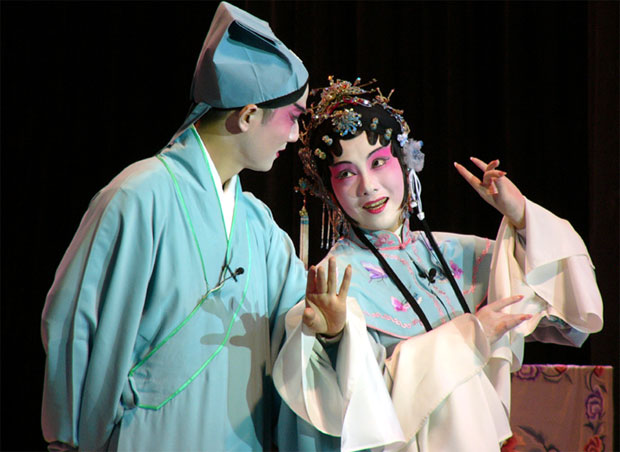As the play is Older Than Steam, all spoilers on this page are unmarked.

Tang Xianzu's kunqu opera The Peony Pavilion, or 牡丹亭 (Mǔdāntíng), was Ming-dynasty China's answer to Romeo and Juliet. A lyrical celebration of romance that premiered in 1598, it ignited the Chinese equivalent of the Romantic movement— the cult of qing, or sensibility. It also spawned an outpouring of Fan Art, Fanfiction, and Fan Wank in the form of readers' commentaries, making these behaviors Older Than Steam. Crazed Fan Girls were said to offer themselves up to Tang on a regular basis, while Fan Boys busied themselves painting miniatures of the play's winsome young heroine to sell for cheap.
The Ingenue, budding Du Liniang ditches her lessons one day to take a nap in the garden. Asleep, she meets dashing scholar Liu Mengmei, who romances her in her dreams. Long after she wakes up, Liniang continues to obsess over her dream and begins to waste away from literal lovesickness. She dies, but not before leaving behind a portrait of herself at the height of her beauty.
Liu Mengmei shows up in her old haunt, the flower garden, looking for the beautiful maiden he fell in love with once in a dream. He takes up residence in the shrine dedicated to his unknown lover's memory and pores over her self-portrait each night with no clue who the subject is. Meanwhile, Liniang descends to the underworld, where a sympathetic judge decides she deserves one last shot at love.
The Peony Pavilion contains examples of:
- All Just a Dream: Subverted. A dream ignites the entire plot.
- Can't Have Sex, Ever: Sister Stone's hymen is rock hard— hence the name— forcing her to leave her marriage for the cloisters.
- Comically Missing the Point: Liniang's tutor assigns her a bunch of love poems from the Book of Songs for her moral instruction, making her even more dreamy and lovelorn.
- The Fair Folk: The Flower Spirit who watches over the lovebirds when they first consummate their affair. Liniang also gets mistaken for one when she shows up in ghostly form.
- Fantastic Romance: When Liniang is a ghost (who can apparently still have sex), before Mengmei helps restore her to her earthly body.
- Hilarity Ensues: Liu Mengmei, fresh from pwning the imperial examinations, comes to pay his respect to his father-in-law who... mistakes him for a graverobber?
- Love Before First Sight: Neither protagonist met each other in person before they fell in love.
- Meaningful Name: Liniang's name means "bridal". Liu Mengmei is "Willow Dream-of-Apricot"— a name he chose after the garden dream to make himself more easily identifiable by his dream lover.
- Romanticism Versus Enlightenment: The Chinese version, li (rationality) verses qing (sensibility).
- Take That!: To orthodox Confucianists. Was also subjected to this by Kong Shangren in Peach Blossom Fan— he basically said the Ming dynasty fell because people liked The Peony Pavilion too much.
- Technical Virgin: After her resurrection, Liniang mentions she's still a virgin even though Mengmei slept with her in both dream and ghost form already.
- What the Hell, Hero?: Mengmei fails to recognize the ghost of Liniang when she appears, even though he's been staring at her portrait every night.
